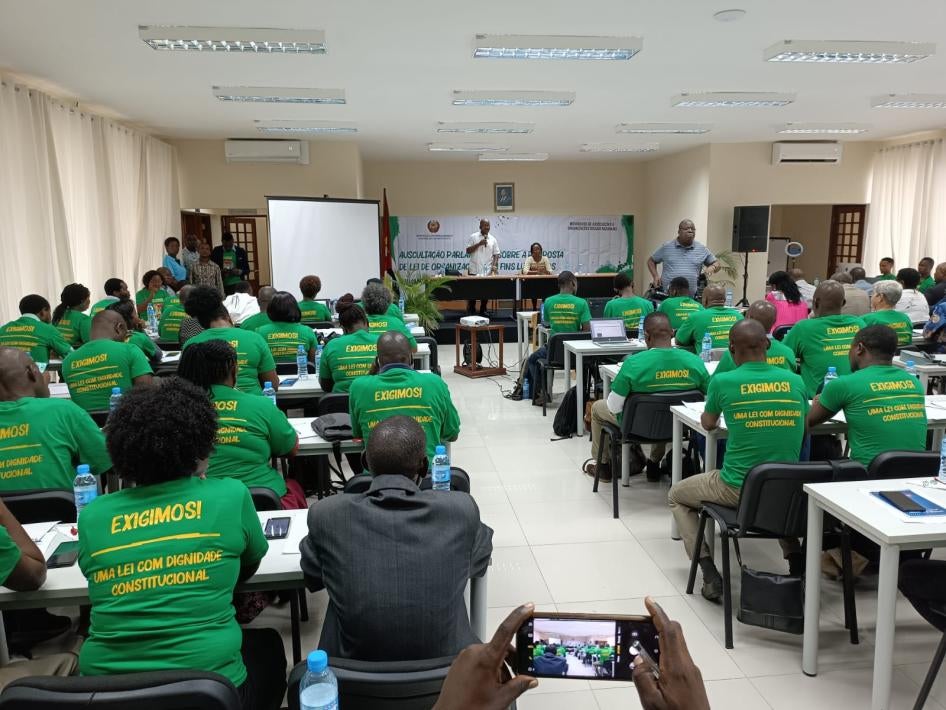(Johannesburg) – Mozambique authorities should withdraw a draft law on nonprofit organizations that would undermine the work of civil society groups and the right to freedom of association in the country, Human Rights Watch said today.
The government says the Draft Law on the Creation, Organization, and Operation of Nonprofit Organizations is intended to counter money laundering and terrorist financing as its security forces battle an Islamic State- (ISIS) linked armed group, locally known as Al-Shabab or Mashababos, in the northern part of the country. The draft law permits excessive government interference with nongovernmental groups, including the authority to shut an organization down.
“Mozambican authorities shouldn’t use the fight against the local Al-Shabab as an excuse to repress civil society organizations,” said Ashwanee Budoo-Scholtz, deputy Africa director at Human Rights Watch. “The government should promptly withdraw the nonprofit organizations bill from parliament.”
Parliament is set to approve the bill during the session that starts on February 22, 2023. The Mozambican government approved the draft law in September 2022, after the Financial Activities Task Force (FATF), an influential intergovernmental organization that monitors countries’ efforts to counter money laundering and terrorist financing, placed Mozambique under increased monitoring in 2021.
In October 2022, the task force added Mozambique to its “gray list,” triggering possible economic sanctions from international institutions, such as the International Monetary Fund and the World Bank, and reduced trade. Among other things, it recommended that Mozambique assess the risk of nonprofits becoming money laundering or terrorist financing fronts. However, leading domestic civil society groups have criticized the draft law as a government tool to silence peaceful critics, including nongovernmental organizations.
Paula Monjane, the executive director of the Centre for Learning and Capacity Building for Civil Society (CESC), told Human Rights Watch, “The government is intentionally trying to shut down the organizations that fight for transparency and good governance.”
Edson Cortez, executive director of the Centre for Public Integrity, said that “This is an attempt to control civil society organizations, in a context where Frelimo [the ruling party] feels that the only structured voices that present arguments against its governance, are in the civil society.”
The draft law contains several articles that contravene the Mozambican Constitution and regional and international human rights instruments to which Mozambique is party, including the African Charter on Human and Peoples’ Rights, the African Commission Guidelines on Freedom of Association and Assembly, and the International Covenant on Civil and Political Rights.
Article 12 of the draft law requires “the existence of a minimum of 10 members over the age of 18” for the creation of national nongovernmental organization. This requirement is contrary to the African Commission Guidelines on Freedom of Association and Assembly, which provide that “no more than two people shall be required in order to found an association.”
Article 33 requires national nongovernmental organizations to submit, every year, proof of their good and regular functioning, including an accounting of their funds and activities. Under article 36, the Justice Ministry, not a court, could dissolve any organization that fails to submit this information.
The African Commission Guidelines provide that suspension of an association “for a serious violation of national law… may only be taken following a court order, and dissolution only following a full judicial procedure and the exhaustion of all available appeal mechanisms.”
“The government is granting itself the power to extinguish associations in clear violation of both the Constitution of Mozambique and the African Charter on Human and Peoples’ Rights,” said Adriano Nuvunga of the Centre for Democracy and Development (CDD). “[This draft law] comes to silence the civic space and democracy in Mozambique.”
United Nations Security Council resolutions require countries to criminalize terrorist financing. However, the Security Council and the FATF task force have also warned that such measures need to fully respect the rights to freedom of expression and association, including in the work of civil society organizations.
Following years of criticism from nongovernmental organizations around the world that governments were using counterterrorism financing measures to curtail their work, in 2016, the task force revised its guidance regarding nonprofit risks and began advising countries that “[n]ot all NPOs [nonprofit organizations] are high risk, and some may represent little or no risk at all.” Nevertheless, the task force interactions with governments on adopting or amending counterterrorism financing laws remain opaque and such laws continue to have a destructive effect on civil society, critics say.
The African Commission should press the Mozambique government to respect the regional body’s guidelines and ensure that all domestic laws are in line with the country’s regional obligations, Human Rights Watch said. International partners, including FATF, should warn the Mozambican government about the harm posed by the draft law to civil society groups and urge the government to withdraw it immediately.
“The Mozambique government should ensure that all the country’s laws are in line with international and regional standards,” Budoo-Scholtz said. “Even if the government never took action against a nongovernmental group, the very fact that such a law existed would have a serious chilling effect on the rights to freedom of expression and association in the country.”








